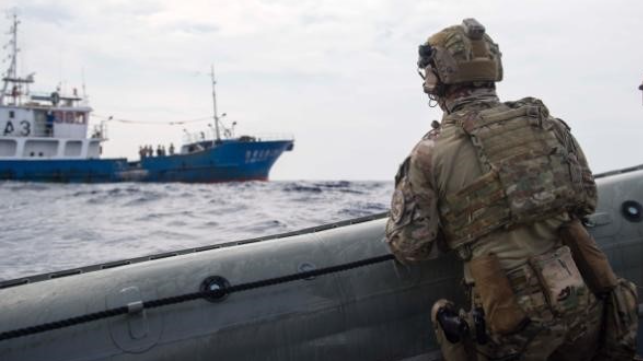U.S. Coast Guard Expands its Reach in Pacific With Navy Partnership

The U.S. Coast Guard and U.S. Navy have launched a joint mission in the Western and Central Pacific to combat illegal, unregulated and unreported fishing (IUU fishing) and boost regional security.
The Independence-variant littoral combat ship USS Tulsa and an embarked Coast Guard law enforcement detachment are conducting maritime law enforcement operations in the region, using their authorities under international law and the Western and Central Pacific Fisheries Convention. The intent is to protect U.S. interests and Pacific island nations’ resource security and sovereignty.
The patrol is part of the Oceania Maritime Security Initiative (OMSI), a Department of Defense program that leverages assets in transit through the region to improve maritime security and maritime domain awareness.
“USS Tulsa is proud to contribute to the OMSI mission” said Cmdr. William Dvorak, Tulsa's commanding officer. “Working with the embarked U.S. Coast Guard law enforcement detachment, our crew is looking forward to supporting maritime security in the Indo-Pacific.”
The OMSI partnership allows U.S. Coast Guard law enforcement to conduct operations from U.S. Navy platforms, in coordination with the Western and Central Pacific Fisheries Commission.
“Our team is ready and excited to execute the OMSI mission,” said Cmdr. Robert Berry, commanding officer of the embarked law enforcement detachment. “Collaborating with our U.S. Navy counterparts enables us to monitor and deter IUU fishing in the Western and Central Pacific and provides a presence for maritime surveillance and security in the region.”
The U.S. Navy, Marine Corps and Coast Guard recently released a joint strategy outline for the Western Pacific, and it incorporates an enhanced overseas presence and law enforcement role for Coast Guard assets. The near-term components of the strategy are centered on deterring Chinese "incrementalism" - the "salami-slicing" strategy employed by Chinese forces to gradually assert control over contested areas in the Indo-Pacific. China's maritime expansion strategy includes "gray zone" operations carried out by commercial fishing vessels, both for profit and for the purpose of asserting Chinese sovereignty claims.

that matters most
Get the latest maritime news delivered to your inbox daily.
"Deterring and contesting incrementalism requires firm and persuasive operations to confront malign behavior. Ready, forward-deployed naval forces will accept calculated tactical risks and adopt a more assertive posture in our day-to-day operations," the services wrote in the strategy document.
The U.S. Coast Guard plays a role in this effort by enforcing the rule of law - conducting freedom of navigation operations to challenge illegal maritime claims, combating illegal fishing and transnational crime with its boarding and law enforcement capabilities, and enforcing sanctions through maritime interdiction operations. "Coast Guard forces provide additional tools for crisis management through capabilities that can de-escalate maritime standoffs nonlethally," the services wrote.
